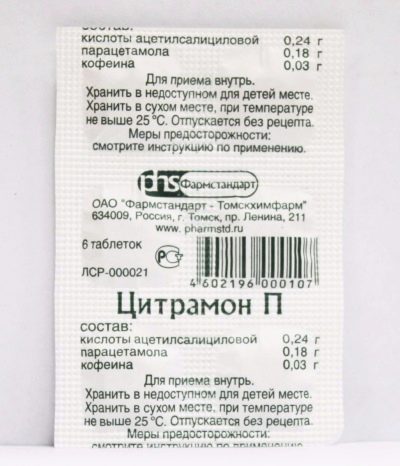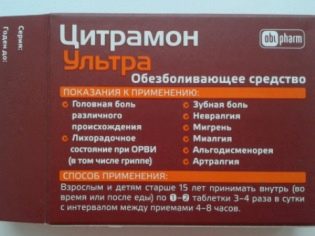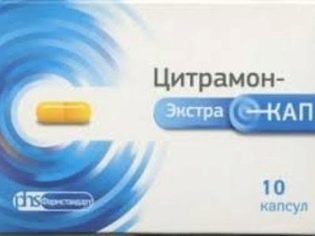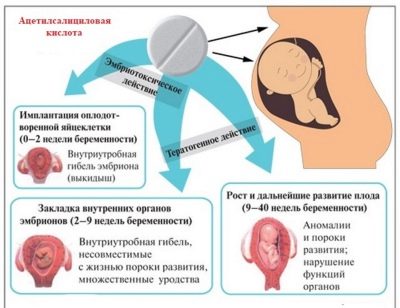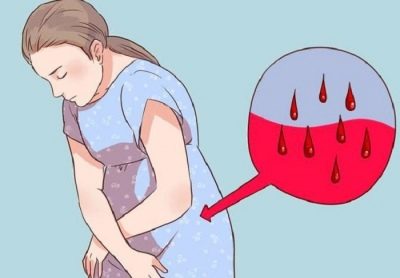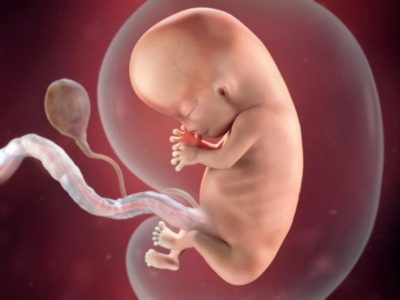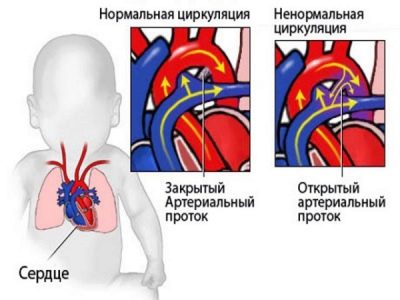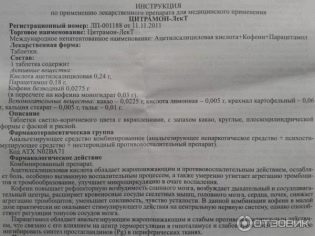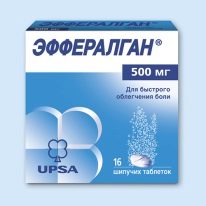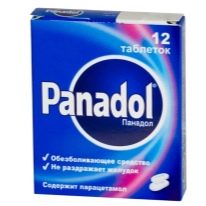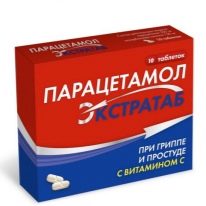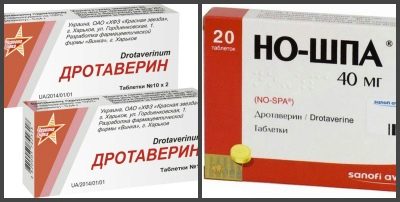"Citramon" during pregnancy: instructions for use
Headache worries expectant mothers quite often. This is associated with changes in the vascular system during the carrying of the baby, and with the change of hormonal levels. The result of increased stress on the vessels of the head are quite intense pain. In addition, a pregnant woman can catch a virus or catch a cold, which causes her temperature to rise, there is pain in the joints, a sore throat, and so on.
And if a woman used “Citramon” to combat such symptoms before the “interesting position”, then with an eye on the baby in her stomach, it is not worth taking such a remedy. If the general condition of the future mother has deteriorated, before looking for pills in the home medicine cabinet, you need to make sure that they do not harm the baby in the womb.
Drug features
"Citramon" is a popular non-narcotic analgesic drug with a combined composition. Its ingredients not only reduce the sensation of pain, but also have anti-inflammatory as well as antipyretic effects. Previously, the composition of the drug was slightly different, but one of the components called phenacetin was banned from use, as it adversely affected the kidneys.
So a modern version of the medicine appeared, in the name of which the letter “P” was added. It is represented by round tablets, painted in brown. They are sold either in cell shells or in plastic jars. Any "Citramon P" includes three active ingredients at once:
- acetylsalicylic acid at a dosage of 240 mg;
- paracetamol in the amount of 180 mg;
- caffeine, the dose of which in 1 tablet is 30 mg.
There is also a “Citramon P forte” with an increased dosage of the same components (320, 240 and 40 mg, respectively), “Citramon-Borimed” with slightly different doses of active substances (220, 200 and 27 mg, respectively) and “Citramon-LekT” with reduced dosage of caffeine (27 mg).
Separately produced tablets in the shell called "Citramon Ultra", which are easy to swallow due to the smooth surface and oblong shape. Compared to the standard “Citramone II,” they also contain slightly less caffeine (27 mg). In addition, the company Pharmstandard-Leksredstva "produces analog capsules, which is called" Citramon-ExtraKap. "
How does it work?
The components of "Citramone" reinforce the influence of each other and provide a pronounced therapeutic effect:
- thanks to acetylsalicylic acid, which we also know as aspirin, the drug can reduce pain caused by inflammation, as well as reduce body temperature;
- due to caffeine, the drug normalizes the tone of the cerebral vessels and increases blood flow in them, as well as activates the work of brain cells;
- the presence of paracetamol in the tablet or capsule provides an additional analgesic and antipyretic effect.
Taking into account the described effects of the drug, it becomes clear that the reason to apply "Citramon" is one of these symptoms:
- headache;
- toothache;
- muscle pain;
- fever;
- neuralgia;
- migraine;
- joint pain.
Is pregnant allowed?
According to doctors, “Citramon” is not the best option for headache and toothache during pregnancy, because its components are not safe for the fetus. There are limitations for taking such medication depending on the risks to the child and on the gestational age.
1 term
In the early stages of pregnancy, taking "Citramon" is prohibited. The most harmful component of tablets and capsules is acetylsalicylic acid. She noted teratogenic effect, that is, such a compound can cause malformations and fetal death.
One of the frequent violations triggered by aspirin taken in the first trimester is the splitting of the upper palate, also known as the cleft palate or cleft lip. With such a pathology, the processes of the jaw do not grow together, therefore, after birth, the child has a cleft in the middle of the sky. The problem is solved with the operation in 3-6 months or later.
Due to blood thinning, aspirin also increases the risk of bleeding. If the future mom's blood vessels are weak and the uterus is elevated, taking Citramone can trigger uterine bleeding, which will result in impaired fetal development due to lack of oxygen and nutrients.
Caffeine is considered no less harmful for early pregnancy. According to various sources, this substance can slow down the development of the crumbs, as well as adversely affect the cardiac activity of the fetus. Because of its ability to increase blood pressure, caffeine also increases the burden on the kidneys and blood vessels of the expectant mother.
Paracetamol should be avoided in the first trimester.. Although this substance is considered to be the safest ingredient of Citramone, in some cases it can also cause impairment of the infant’s development. Only one conclusion - in the first 12 weeks, “Citramon” should not be taken.
2 term
At this time, and my mother's health usually improves, and all the organ systems of the baby have already been laid, so if you suddenly need to drink "Citramon", it is permissible, but it is best to take this drug after consulting a doctor. The specialist will select a safe dose and frequency of use, since they differ from the dosages for women who are not “in position”.
According to most medical professionals, a single use of Citramone to reduce the temperature or get rid of the pain will not affect the future mother and baby if the use of this medication is not contraindicated, and the woman does not exceed the prescribed dose. All side effects of this medication usually occur with prolonged or frequent use.
It is permissible to use such a drug for emergency treatment in case of severe headache or toothache. But if it is possible not to drink a capsule or pill, it is worth using.
In case of tolerable pain or low fever, it is advisable not to use any medication. And only in the case when the painful sensations strongly affect the future mother's state of health, or the body temperature rises above 38 degrees, and there are no other antipyretic drugs at home, the reception of Citramone will be justified.
3 term
Although many drugs are relatively safe in the last months of pregnancy, the use of Citramone for headaches for 28 weeks and later is contraindicated. The prohibition of the drug in the later stages is associated with the ability of its components to inhibit the synthesis of prostaglandins, which will inhibit the onset of labor, because these substances prepare the uterus for childbirth. In addition, under the action of aspirin in a baby, the closure of the arterial duct will be impaired, which will affect its pulmonary vessels.
Contraindications
Reception "Citramona" is prohibited if the expectant mother:
- there are lesions of the digestive system in the form of ulcers or erosions;
- bleeding from the intestines or stomach has begun;
- there is hemophilia or another condition where the risk of bleeding is increased;
- disturbed sleep;
- kidney function is impaired;
- increased blood pressure;
- have liver disease;
- no glucose-6-phosphate dehydrogenase;
- there is glaucoma;
- increased excitability of the central nervous system.
Any other serious illness or pregnancy problems should also be a reason for not using Citramone as a painkiller.
How to use?
Usually, according to the instructions, “Citramon” is taken 1 tablet each, but the woman “in position” is often recommended to reduce the dosage to one half per dose, although if there is no effect, the expectant mother can take the whole tablet or capsule.
The frequency of taking the drug should not exceed 3-4 times a day, and the intervals between the use of individual doses should be at least 4 hours. However, medications should be taken as little as possible for pregnant women - if one dose is enough to eliminate the pain, then you do not need to repeat the administration of "Citramone". If, however, the pain recurs after some time, it is better to consult a doctor about a safer counterpart.
Side effects
“Citramon” has quite serious negative effects on the patient’s body. The drug may:
- provoke allergic reactions;
- enhance nervous irritability;
- cause pain in the stomach and nausea;
- violate wakefulness and sleep;
- oppress blood formation;
- cause internal bleeding;
- increase blood pressure;
- worsen kidney function.
This list of side effects is far from complete, but they rarely occur. Judging by the reviews, the risk of terrible consequences does not mean at all that they will appear in the future mother. However, it is still necessary to know how much the drug can cause a woman’s body. It is because of him that medication is even taken in the second trimester only when absolutely necessary.
What is better to replace?
If a woman “in position” suffers from a headache, her body temperature rises, or other localization pains appear, then doctors advise instead of taking “Citramone” to take any of the drugs based on paracetamol. Such drugs are presented in different forms and are sold under different names ("Efferalgun", "Paracetamol", "Panadol").
They are considered to be more harmless counterparts allowed at any stage of pregnancy, but they are also recommended to be taken only as prescribed by a doctor. It is these drugs that are advised to buy for a home first aid kit, as they will help out not only during pregnancy, but also during breastfeeding, when many other antipyretic drugs and analgesics are contraindicated. In addition, drugs containing paracetamol can be used in infants from 3 months of age.
In the first and second trimester, an effective substitute for “Citramon” can be “Nurofen"Or any of its analogs based on ibuprofen. Such medicine is produced in tablets, suspensions, capsules and gel, therefore, depending on the ailment, you can choose the most effective form. For example, if you have a severe headache, you can drink a fast-acting capsule, and if the expectant mother has stretched the muscle, then the use of the gel is indicated. However, in the last months of gestation, any preparations containing ibuprofen cannot be taken, since they can adversely affect the course of labor.
If the painful sensations were caused by spasms, then the expectant mother will be helped by “Drotaverine” or “No-shpa". Their reception during pregnancy does not adversely affect the baby, but must be agreed with the doctor. In addition to medications, non-drug ways of getting rid of migraine can help a woman. For example, a pregnant woman can apply a star on the temples, attach cabbage leaves to her forehead, drink sweet tea, or massage the neck area.
In order for a headache to occur less frequently, the expectant mother is recommended to adjust sleep, walk more and avoid overwork.Lack of oxygen is considered one of the main causes of migraine, so if you have unpleasant sensations, you should first of all air out the room or go for a walk. For recurring pains or very intense pain, you should consult a doctor. Perhaps the reason for the ailment is increased blood pressure, problems with the vessels or strong experiences. All of these conditions can be corrected by certain medications that the doctor must select.
For more information on whether it is possible to use "Citramon" during pregnancy, see the following video.

